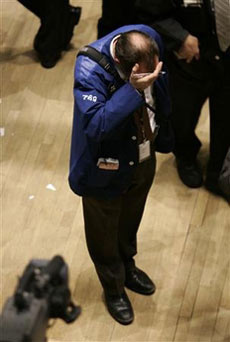Stocks see biggest fall in 10 years
(Agencies/China Daily)Updated: 2007-02-28 08:31
 A trader on the floor of the New York Stock Exchange holds his head in his hand during the closing minutes of the trading session in New York, February 27, 2007. [Reuters]  |
The Dow fell 546.02, or 4.3 percent, to 12,086.06 before recovering some ground in the last hour of trading to close down 416.02, or 3.29 percent, at 12,216.24, leaving it in negative territory for the year. Because the worst of the plunge took place after 2:30 pm, the New York Stock Exchange's trading limits, designed to halt such precipitous moves, were not activated.
The decline was the Dow's worst since Sept. 17, 2001, the first trading day after the terror attacks, when the blue chips closed down 684.81, or 7.13 percent.
The drop hit every sector across the market, and a total of US$632 billion was lost in total in US stocks on Tuesday, according to Standard & Poor's Corp. Riskier issues such as small-cap and technology stocks suffered some of the biggest declines, but big industrial companies, those that are often hurt the most in an economic downturn, also were pummeled, with raw materials producers among the hardest hit.
But analysts who have been expecting a pullback after a huge rally that began last October and sent the Dow to a series of record highs, were unfazed by Tuesday's drop.
"This corrective consolidation phase isn't just going to be one day, but we don't believe this is going to be a bear market," said Bob Doll, BlackRock's global chief investment officer of equities.
Some investors also tried to put Tuesday's slide into a longer-term perspective.
Still, traders' dwindling confidence was knocked down further by data showing that the economy may be decelerating more than anticipated. A US Commerce Department report that orders for durable goods in January dropped by the largest amount in three months exacerbated jitters about the direction of the US economy, just a day after former Federal Reserve Chairman Alan Greenspan said the United States may be headed for a recession.
"It looks more and more like the economy is a slow growth economy," said Michael Strauss, chief economist at Commonfund. "Moderate economic growth is good -- an abrupt stop in economic growth scares people."
The market had been expecting the US government on Wednesday to revise its estimate of fourth-quarter GDP growth down to an annual rate of about 2.3 percent from an initial forecast of 3.5 percent, and grew increasingly nervous on Tuesday that the figure could come in even lower.
But a growing feeling that Wall Street, which has had a big run-up since October, was due for a correction also played into Tuesday's decline.
"I think that the market was prepared to pull back. The constellation of issues that were worrying the market came to a head," said Quincy Krosby, chief investment strategist at The Hartford.
Still, the market will need to pull back further before its decline can officially be called a correction, which is considered a 10 percent decline in a bull market. Just a week ago, the Dow had reached new closing and trading highs, rising as high as 12,795.92; it's now down 4.5 percent from that level.
The broader Standard & Poor's 500 index fell 50.33, or 3.47 percent, Tuesday to 1,399.04, and the tech-dominated Nasdaq composite index was off 96.65, or 3.86 percent, at 2,407.87. Both indexes have also turned negative for the year.
The Russell 2000 index of smaller companies dropped 31.03, or 3.77 percent, to 792.66.
Hong Kong's benchmark Hang Seng Index dropped 1.8 percent, and Malaysia's Kuala Lumpur Composite Index fell 2.8 percent. Japan's Nikkei stock average fell a more moderate 0.52 percent, but European markets were rattled -- Britain's FTSE 100 lost 2.31 percent, Germany's DAX index dropped 2.96 percent, and France's CAC-40 fell 3.02 percent.
Bond prices shot higher as investors bought into the safe-haven Treasury market, pushing the yield on the benchmark 10-year Treasury briefly note down to 4.47 percent, its lowest level so far this year, from 4.63 percent late Monday; the yield settled at 4.52 percent.
The durable goods drop raised the chance of the US Federal Reserve easing interest rates later in the year -- a possibility that makes the bond market an attractive place to be right now.
The hope for slowing inflation could be dashed, though, if energy costs keep rising. Oil prices initially fell Tuesday on worries that Chinese demand could be dampened should its economy slow down, but later rose on escalating tensions in the Middle East. Light, sweet crude for April delivery added 7 cents to settle at $61.46 a barrel on the New York Mercantile Exchange.
The dollar slipped against other major currencies, while gold also fell.
 | 1 | 2 |
|
||
|
||
|
|

